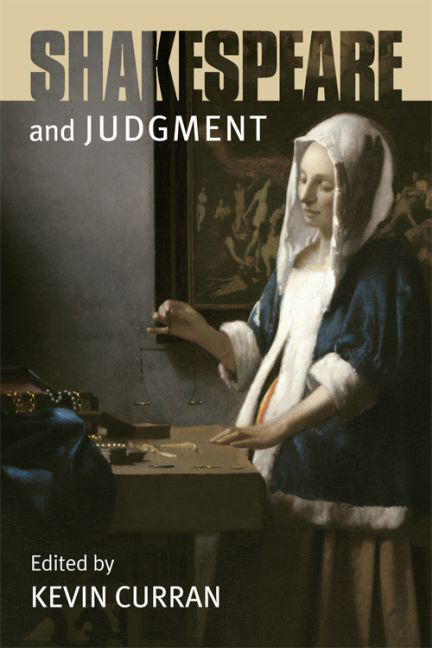Book contents
- Frontmatter
- Contents
- Acknowledgments
- List of Contributors
- Introduction
- Part I Staging Judgment: Deliberation in the Plays
- Part II Audience Judgment: Deliberation in the Theater
- 4 “Gently to hear, kindly to judge”: Minds at Work in Henry V
- 5 “Practis[ing] judgment with the disposition of natures”: Measure for Measure, the “Discoursive” Common Law, and the “Open Court” of the Theater
- 6 The Laws of Measure for Measure
- 7 Prospero's Plea: Judgment, Invention, and Political Form in The Tempest
- Part III The Ethics of Judgment
- Index
7 - Prospero's Plea: Judgment, Invention, and Political Form in The Tempest
from Part II - Audience Judgment: Deliberation in the Theater
Published online by Cambridge University Press: 10 May 2017
- Frontmatter
- Contents
- Acknowledgments
- List of Contributors
- Introduction
- Part I Staging Judgment: Deliberation in the Plays
- Part II Audience Judgment: Deliberation in the Theater
- 4 “Gently to hear, kindly to judge”: Minds at Work in Henry V
- 5 “Practis[ing] judgment with the disposition of natures”: Measure for Measure, the “Discoursive” Common Law, and the “Open Court” of the Theater
- 6 The Laws of Measure for Measure
- 7 Prospero's Plea: Judgment, Invention, and Political Form in The Tempest
- Part III The Ethics of Judgment
- Index
Summary
Theatrical epilogues – onstage speeches addressed to the audience at the end of a performance – were a common feature of English Renaissance plays. They were typically read rather than memorized, sometimes by a character in the play, sometimes by someone else. An epilogue asserts the merits of the play it punctuates and asks for audience approval in the form of applause. Far more epilogues occurred in performance than survive in print and of those that do survive, most were occasional. That is, they were designed for particular venues, particular audiences, or particular performances, though some epilogues may have been more permanent features of the plays they accompanied. What all epilogues have in common is their capacity to effect what Robert Weimann describes as a “redistribution of authority in the playhouse.” When an epilogue speaker requests applause, this changes the relationship between actors and audience and between fiction and life. Playgoers are now expected to do something, to respond based on the kind of emotional and intellectual experience they have had up to that point. The epilogue, in other words, draws attention to the active and participatory nature of theatrical spectatorship and the degree to which audiences were implicated in the imaginative world of the plays they attended.
This chapter concerns Prospero's epilogue in The Tempest, a particularly well-known example of the form and one that has become a standard feature of the play in performance. It occurs in the final moments of the play, just after Prospero has released the island castaways and set his servant Ariel free. Addressing the audience directly, Prospero says,
Now my Charmes are all ore-throwne,
And what strength I have's mine owne.
Which is most faint: now ‘tis true
I must be heere confinde by you,
Or sent to Naples. Let me not
Since I have my Dukedome got,
And pardon'd the deceiver, dwell
In this bare Island by your Spell,
But release me from my bands
With the helpe of your good hands:
Gentle breath of yours, my Sailes
Must fill, or else my project failes,
Which was to please: Now I want
Spirits to enforce: Art to inchant,
And my ending is despaire,
Unlesse I be reliev'd by praier
Which pierces so, that it assaults
Mercy it selfe, and frees all faults.
As you from crimes would pardon'd be,
Let your Indulgence set me free. (2322–41)
- Type
- Chapter
- Information
- Shakespeare and Judgment , pp. 157 - 172Publisher: Edinburgh University PressPrint publication year: 2017



